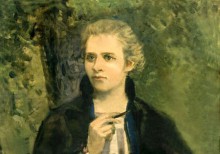In the village of Kolodiazhne near Kovel, at the Lesia Ukrainka Memorial Museum (former Kosach family nest), visitors gathered in the so-called “little white house.” There is a room where Lesia lived, with her own belongings, among which a piano she played. During the literary evening Taisa Viun, student of the local music school, played the piano, while secondary school students and museum staff recited Lesia’s poems. Olha Boiko, the curator of the museum, says that each had picked a poem to their liking. Tellingly, not only lyrical poems were recited, but also those that rang a civic note.
“Lesia lived more than a century ago, but her works seem to have been written yesterday at the latest; they are more topical for us than for her contemporaries. We emphasize Lesia Ukrainka’s prophetic talent during our excursions. ‘Oh Lord, how long shall we roam looking for fatherland in our own land?’ Today Ukrainians are confronted with this question as well. ‘God, send us fair enemies!’ has been topical at all times throughout Ukrainian history, just as it is today. If Lesia Ukrainka’s works were more thoroughly studied at school; if teachers and students really wanted to know why her heart ached for Ukraine and its people; if they pondered over why her century-old prophecies about us are coming true now, we would have a different situation today,” believes Boiko.








